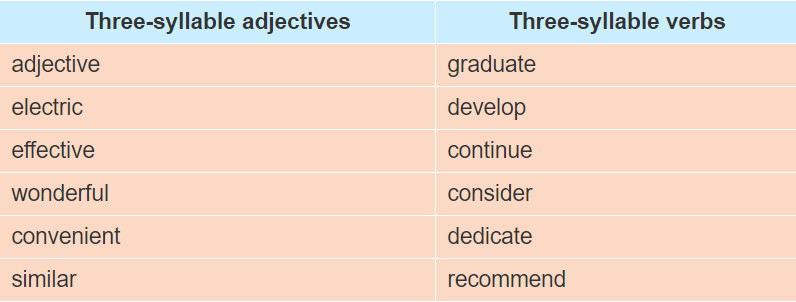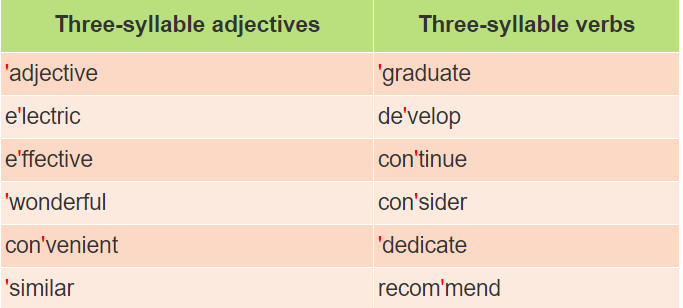 Giải bài tập tiếng anh 10 thí điểm, Tiếng Anh lớp 10 mới - Để học tốt tiếng anh 10 thí điểm
Giải bài tập tiếng anh 10 thí điểm, Tiếng Anh lớp 10 mới - Để học tốt tiếng anh 10 thí điểm
 Unit 8: New Ways To Learn
Unit 8: New Ways To Learn
Looking Back - Unit 8 trang 34 SGK Tiếng Anh 10 mới
Listen again and put a mark (') before the stressed syllable.
Pronunciation 1
Video hướng dẫn giải
1. Listen and repeat.
(Nghe và lặp lại.)

Pronunciation 2
Video hướng dẫn giải
2. Listen again and put a mark (') before the stressed syllable.
(Nghe lại và đặt dấu ' trước âm tiết nhấn.)

Lời giải chi tiết:
|
Three-syllable adjectives (Tính từ ba âm tiết) |
Three-syllable verbs (Động từ 3 âm tiết) |
|
'adjectives, e'lectric |
'graduate, de'velop |
|
e'ffective, 'wonderful |
con'tinue, con'sider |
|
con'venient, 'similar |
'dedicate, recom'mend |
Vocabulary 1
Video hướng dẫn giải
1. Complete the text with the appropriate words from the box.
(Hoàn thành bài văn với những từ phù hợp có trong khung.)
|
a. devices |
b. dictionary |
c. technology |
|
d. electric |
e. learn |
f. advantage |
Electronic dictionaries are now common in English classes. They can be very easily downloaded into your personal (1) _______ device that you carry with you everywhere. This new technology is wonderful, but it can affect your learning. People may think a dictionary is the best way to (2) _______ new words. In fact, learning new vocabulary by translating slows down your learning process. A (3) _______ should only be used when all other ways of finding out the meaning have failed. There are other ways of understanding new vocabulary, such as looking at the parts of the word or using context to guess its meaning. Modern (4) _______ has entered your life and you should try to take (5) _______ of it. Electronic dictionaries in mobile (6) _______ are a great learning tool, but you need to think how to use them effectively.
Phương pháp giải:
a. devices (n): thiết bị
b. dictionary (n): từ điển
c. technology (n): công nghệ
d. electric (adj): mang điện
e. learn (v): học
f. advantage (n): lợi thế
Lời giải chi tiết:
|
1 - d. electronic |
2 - e. learning |
3 - b. dictionary |
|
4 - c. technology |
5 - f. advantage |
6 - a. devices |
Electronic dictionaries are now common in English classes. They can be very easily downloaded into your personal (1) d. electronic device that you carry with you everywhere. This new technology is wonderful, but it can affect your learning. People may think a dictionary is the best way to (2) e. learn new words. In fact, learning new vocabulary by translating slows down your learning process. A (3) b. dictionary should only be used when all other ways of finding out the meaning have failed. There are other ways of understanding new vocabulary, such as looking at the parts of the word or using context to guess its meaning. Modern (4) c. technology has entered your life and you should try to take (5) f. advantage of it. Electronic dictionaries in mobile (6) a. devices are a great learning tool, but you need to think how to use them effectively.
Tạm dịch:
Từ điển điện tử hiện nay phổ biến trong các lớp học tiếng Anh. Chúng có thể rất dễ tải về thiết bị điện tử cá nhân của bạn mà bạn có thể mang theo đến mọi nơi. Công nghệ mới này thật tuyệt, nhưng nó có thể ảnh hưởng đến việc học của bạn. Người ta có thể nghĩ một từ điển là cách tốt nhất để học từ mới. Thực tế, việc học từ mới bằng cách dịch ra làm chậm đi quá trình học của bạn. Từ điển chỉ nên được sử dụng khi tất cả những cách tìm ra nghĩa đã thất bại. Có những cách khác để hiểu từ vựng mới, như là nhìn vào những thành phần của từ hoặc sử dụng ngữ cảnh để đoán nghĩ. Công nghệ hiện đại đã thâm nhập vào cuộc sống của bạn và bạn nên cố gắng tận dụng nó. Từ điển điện tử trong những thiết bị di động là một công cụ học tập rất hay, nhưng bạn cũng cần nghĩ đến cách sử dụng chúng hiệu quả.
Vocabulary 2
Video hướng dẫn giải
2. In pairs, ask and answer the following questions.
(Làm theo cặp, hỏi và trả lời những câu hỏi sau.)
1. How can we use electronic dictionaries?
(Chúng ta có thể sử dụng từ điển điện tử như thế nào)
2. Why is learning new vocabulary with a dictionary not the best way?
(Tại sao việc học từ mới với một từ điển không phải là cách tốt nhất?)
3. What should we do now that modern technology has entered our lives?
(Chúng ta nên làm gì khi công nghệ hiện đại bước vào vào cuộc sống của chúng ta?)
Lời giải chi tiết:
1. We can easily download them into your personal electronic device we can carry with us everywhere.
(Chúng ta có thể dễ dàng tải chúng vào những thiết bị điện tử cá nhân mà chúng ta có thể mang theo chúng ở mọi nơi.)
2. Because learning new vocabulary by translating slows down the learning process.
(Bởi vì việc học từ mới bằng cách dịch ra làm chậm đi quá trình học.)
3. We need to think how to use them effectively.
(Chúng ta cần nghĩ ra cách sử dụng chúng hiệu quả.)
Grammar 1
Video hướng dẫn giải
1. Use ‘which’, ‘that’, ‘who’ or ‘whose" to fill in each gap.
(Sử dụng “which”, “that”, “who” hoặc “whose” để điền vào chỗ trống.)
1. The house ________ my father built is big.
2. Mr Xuan Truong, ________ was my first teacher, received an award for teaching excellence.
3. That media player, ________ I often use to practise English, has some great apps.
4. That's Peter, ________father has just come back from the Philippines.
5. The woman ________ you have just spoken to is my favourite English teacher.
6. People ________ work involves using a computer for most of the day may suffer from headaches.
Phương pháp giải:
- who thay cho chủ ngữ chỉ người;
- which thay cho chủ ngữ hoặc tân ngữ chỉ vật;
- whom thay cho tân ngữ chỉ người;
- that có thể thay thế cho who, whom, which trong mênh đề quan hệ hạn định; ngoài ra chỉ dừng riêng that, trong các trường hợp trước that có các từ all, first, second,... last, most, best, only.
Lời giải chi tiết:
|
1. which/that |
2. who |
3. which |
|
4. whose |
5. who/that |
6. whose |
1. The house which/that my father built is big.
(Căn nhà mà cha tôi đã xây thì to.)
2. Mr Xuan Truong, who was my first teacher, received an award for teaching excellence.
(Thầy Xuân Trường, người là giáo viên đầu tiên của tôi, đã nhận được một giải thưởng cho việc dạy học xuất sắc.)
3. That media player, which I often use topractise English, has some great apps.
(Công cụ đa phương tiện, mà tôi thường sử dụng để thực hành tiếng Anh, có vài ứng dụng hay.)
4. That's Peter, whose father has just comeback from the Philippines.
(Đó là Peter, người mà có cha vừa trở về từ Philipines.)
5. The woman who/that you have just spoken to is my favourite English teacher.
(Người phụ nữ mà bạn vừa nói chuyện là giáo viên tiếng Anh yêu thích của tôi.)
6. People whose work involves using a computer for most of the day may suffer from headaches.
(Người mà công việc của họ liên quan đến việc sử dụng máy tính hầu như cả ngày có thể bị bệnh đau đầu.)
Grammar 2
Video hướng dẫn giải
2. Combine each pair of sentences into one. Use comma(s) if necessary.
(Kết hợp mỗi cặp câu thành một. Sử dụng dấu phẩy (,) nếu cần thiết.)
1. Shakespeare was a famous playwright. His birthplace was Stradord-upon-Avon.
(Shakespeare là một nhà viết kịch nổi tiếng. Nơi ông sinh ra là Stradord-upon-Avon.)
_________________
2. His grandmother had a great influence on his life. She was a hard-working woman.
(Bà ngoại của anh ấy có một ảnh hưởng lớn đến anh ấy. Bà là một người làm việc chăm chỉ.)
_________________
3. Tom has hundreds of books.They are all in foreign languages.
(Tom có hàng trăm quyển sách. Chúng đều bằng tiếng nước ngoài.)
_________________
4. Lan is interested in physics. I don't like it.
(Lan thích môn Vật lý. Tôi không thích nó.)
_________________
5. I will always remember the teacher. He taught me how to read and write.
(Tôi luôn nhớ giáo viên ấy. Thầy đã dạy tôi đọc và viết.)
_________________
6. The girl looked very upset. Her electronic dictionary broke down.
(Cô gái trông bực bội. Từ điển điện tử của cô bị hư.)
_________________
Lời giải chi tiết:
1. Shakespeare, whose birthplace was Stratford-upon-Avon, was a famous playwright.
(Shakespeare người mà sinh ra ở Stratford-upon-Avon, là một nhà viết kịch nổi tiếng.)
2. His grandmother, who was a hard-working woman, had a great influence on his life.
(Bà anh ấy, người mà là một người phụ nữ chăm chỉ, đã có ảnh hưởng lớn đến cuộc sống của anh ấy.)
3. Tom has hundreds of books, which are all on foreign languages.
(Tom có hàng trăm quyển sách bằng ngôn ngữ nước ngoài.)
4. Lan is interested in physics, which I don’t like.
(Lan thích môn vật lý, môn học mà tôi không thích.)
5. I will always remember the teacher who taught me how to read and write.
(Tôi sẽ luôn nhớ người giáo viên mà đã dạy tôi đọc và viết.)
6. The girl whose electronic dictionary broke down looked very upset.
(Cô gái mà từ điển điện tứ của cô ấy bị hư trông rất bực bội.)











